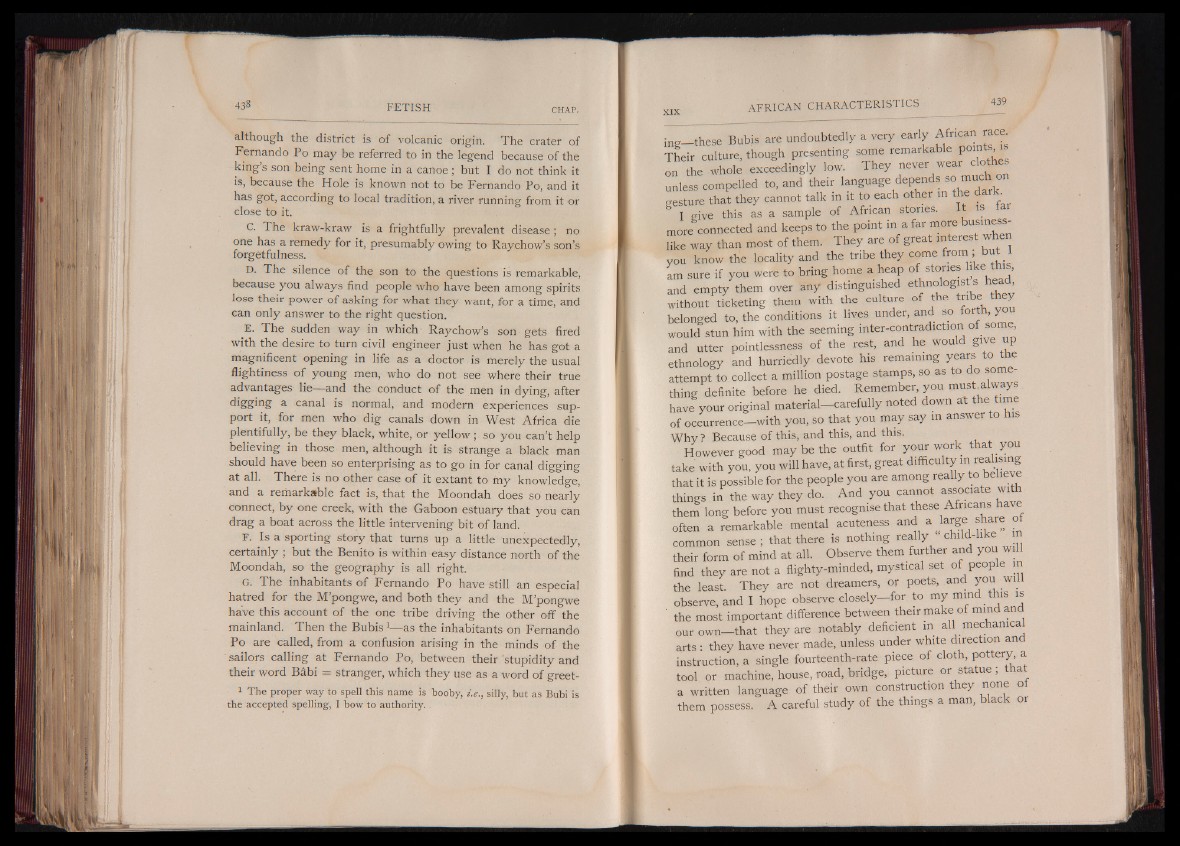
although the district is of volcanic origin. The crater of
Fernando Po may be referred to in the legend because of the
king’s son being sent home in a canoe ; but I do not think it
is, because the Hole is known not to be Fernando Po, and it
has got, according to local tradition, a river running from it or
close to it.
C. The kraw-kraw is a frightfully prevalent disease; no
one has a remedy for it, presumably owing to Raychow’s son’s
forgetfulness.
D. The silence of the son to the questions is remarkable,
because you always find people who have been among spirits
lose their power of asking for what they want, for a time, and
can only answer to the right question.
E. The sudden way in which Raychow’s son gets fired
with the desire to turn civil engineer just when he has got a
magnificent opening in life as a doctor is merely the usual
flightiness of young men, who do not see where their true
advantages lie— and the conduct of the men in dying, after
digging a canal is normal, and modern experiences support
it, for men who dig canals down in West Africa die
plentifully, be they black, white, or yellow; so you can’t help
believing in those men, although it is strange a black man
should have been so enterprising as to go in for canal digging
at all. There is no other case of it extant to my knowledge,
and a remarkable fact is, that the Moondah does so nearly
connect, by one creek, with the Gaboon estuary that you can
drag a boat across the little intervening bit of land.
F. Is a sporting story that turns up a little unexpectedly,
certainly ; but the Benito is within easy distance north of the
Moondah, so the geography is all right.
G. The inhabitants of Fernando Po have still an especial
hatred for the M’pongwe, and both they and the M’pongwe
have this account of the one tribe driving the other off the
mainland. Then the Bubis1— as the inhabitants on Fernando
Po are called, from a confusion arising in the minds o f the
’ sailors calling at Fernando Po, between their stupidity and
their word B&bi = stranger, which they use as a word of greet-
1 The proper way to spell this name is booby, i.e., silly, but as Bubi is
the accepted spelling, I bow to authority. .
ing-these Bubis are undoubtedly a very early African race.
Their culture, though presenting some remarkable points, *
on t h e w h o l e exceedingly low. They never wea
unless compelled to, and their language depends s° much
gesture that they cannot talk in it to each other in the dark
T give this as a sample of African stories. I is
more connected and keeps to the point in a far more businesslike
way than most of them. They are of great interest when
you know the locality and the tribe they come from ; but I
am sure if you were to bring home a heap of stories like this,
and empty them over any distinguished ethnologist s hea
without ticketing them with the culture of the tribe they
belonged to, the conditions it lives under, and so forth, you
would stun him with the seeming inter-contradiction of some,
and utter pointlessness of the rest, and he would give up
ethnology and hurriedly devote his remaining years to the
attempt to collect a million postage stamps, so as to do something
definite before he died. Remember, you must always,
have your original material— carefully noted down at the time
of occurrence— with you, so that you may say in answer to his
Why ? Because of this, and this, and this.
However good may be the outfit for your work that you
take with you, you will have, at first, great difficulty in realising
that it is possible for the people you are among reallyto belie^
things in the way they do. And you cannot associate with
them long before you must recognise that these Africans have
often a remarkable mental acuteness and a large share o
common sense ; that there is nothing really child-like n
their form of mind at all. Observe them further and you wdl
find they are not a flighty-minded, mystical set of people in
the least. They are not dreamers, or poets, and youi wi
observe, and I hope observe closely— for to my mind this
the most important difference between their make of mind and
our own— that they are notably deficient m all mechamca
arts : they have never made, unless under white direction and
instruction, a single fourteenth-rate piece of cloth, pottery, a
tool or machine, house, road, bridge, picture or statue , a
a written language of their own construction t ey ti°ne °
them possess. A careful study of the things a man, black or